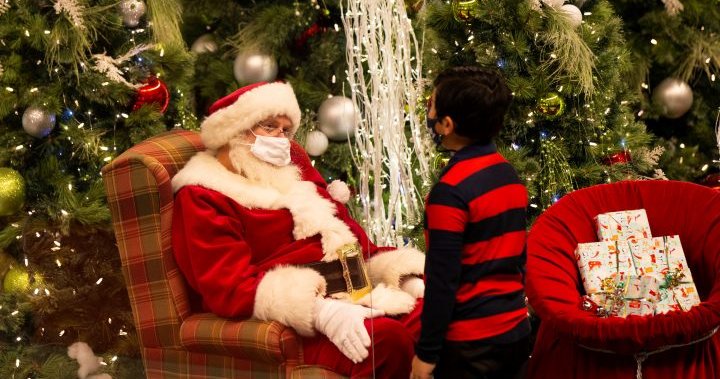COVID-19 surge amid Omicron dampens Christmas celebrations for a second year – National | Globalnews.ca
For the second year in a row, the COVID-19 pandemic has scaled down Christmas celebrations in Canada as the highly-transmissible Omicron variant sweeps across the country.
Ahead of the holidays, several provinces reintroduced restrictions on social gatherings in an attempt to blunt the impact of Omicron, which according to public health officials, is increasingly contributing to a rapid rise in case counts.
Read more:
Omicron and the holidays: How to celebrate safely
In Ontario, no more than 10 people can attend indoor social gatherings — down from 25 — and there’s a maximum of 25 attendees at outdoor social gatherings, down from 100.
The province set a new record for daily COVID-19 infections for the second straight day with nearly 9,600 infections reported a day before Christmas.
A recent poll published on Dec. 20 by Forum Research suggested 51 per cent of Ontarians will cancel holiday gatherings and celebrate within their households only.
Hamilton resident Alyssa Beauchamp is among those. The stay-at-home mother of four will be having a quiet Christmas dinner at home with the kids and her fiancee’ and will drive by to see other family members.
She said “it’s frustrating” to not be able to gather with loved ones as they normally do on Christmas Day.
“It’s unfortunate that people are expected to stay home and not see their families. We’ve been in lockdown for two years, going on three,” the 23-year-old said.

An earlier poll by Ipsos conducted exclusively for Global News in November found 66 per cent of Canadians were optimistic about the holidays compared to 2020, though only 44 per cent said this season will feel “normal” again.
Toronto mom Elena Kuzmich is trying to focus on the positives. Luckily, for her family, they have been able to spend the Christmas holidays, as per usual, at a cottage in Haliburton, north of Toronto, since there are no restrictions on rentals.
“Usually we come here with a bigger group of families and two of these families that used to come this year, one of them is not coming because of uncertainty with Omicron and so they’re just not feeling secure,” Kuzmich told Global News.
As the Omicron variant continues to spread, taking hold as the dominant strain, restrictions on gatherings are also being enforced elsewhere.
In British Columbia, indoor personal gatherings are limited to the household plus 10 guests or one additional household — provided all aged 12 and older are fully vaccinated.
Read more:
Canadians should ‘hunker down’ to slow Omicron spread, Trudeau says
Starting on Boxing Day, Quebecers would need to limit private gatherings to six people — or two families. Premier François Legault said at a news conference Wednesday the current 10-person limit will remain in place for Christmas but urged people to delay their parties if they could, or limit gatherings to one celebration either on Christmas Eve or Christmas Day.
This week, the province shattered a Canada-wide record for the highest daily provincial COVID-19 case count over three days with more than 10,000 new infections reported on Friday.
In Alberta, where Omicron has now become the dominant strain of the virus, household gatherings also remain limited to 10 people, not including children, but guests can come from multiple households. They can include vaccinated and unvaccinated guests.

Just like last year, the pandemic has already caused many holiday celebrations like Santa Claus parades and holiday concerts to be cancelled.
Kuzmich said her children have been unable to enjoy any extra-curricular school activities around Christmas such as holiday-themed plays and parties.
The Toronto Christmas Market is once again not operating this year, but the Distillery District is holding a separate event called the Winter Village, featuring outdoor shopping and food cabins. Proof of full vaccination is required for all visitors aged 12 and above.
For the second year in a row, Kingston’s Holiday Market is being held virtually. Eighty vendors have signed up for this year’s market, which is taking place completely online due to the COVID-19 pandemic.

Federal health officials have urged people to limit the number of people they see over the holiday season to minimize the risk of spreading the Omicron variant of COVID-19.
“I’m urging Canadians across the country to please carefully consider and adjust your holiday plans to minimize risks and maximize layers and quality of protection for you and yours,” said Dr. Theresa Tam, Canada’s chief public health officer, during a Dec. 17 news conference.
Read more:
Canadians should adjust holiday plans amid Omicron, Canada’s top doctor urges
Prime Minister Justin Trudeau, who is self-monitoring for COVID-19 after members of his staff and security team tested positive for the virus, said he would be celebrating Christmas with the immediate household and not seeing friends over the holiday season and New Year’s.
“Quite frankly, there’s a lot of people for whom those conversations around having more restricted holiday gatherings are still better news than what a lot of Canadians are facing,” he said during a virtual COVID-19 news conference on Wednesday.
“People who will be totally alone for Christmas, people who are facing significant health challenges, people who are dealing with mental health issues that have been exacerbated by the past two years of extraordinary difficulty,” he added.

New COVID-19 restrictions have made travelling both internationally and between provinces during the holidays more complicated.
Starting this week, Canadians returning home from trips abroad regardless of length will now have to show proof of a negative PCR COVID-19 test to re-enter the country.
Meanwhile, visitors to Prince Edward Island are now required to isolate for four days. In Newfoundland and Labrador, self-isolation is being enforced for five days.
Fully-vaccinated individuals entering Nova Scotia and New Brunswick do not need to self-isolate. But those who are partially vaccinated or unvaccinated are required to self isolate for seven days in Nova Scotia and 14 days after entering New Brunswick.

The pandemic has also led to a shortage of Christmas trees with demand at an all-time high this season.
Supply shortages are being felt all across North America, driven by increased demand during the COVID-19 pandemic.
“It’s not a Canadian issue, it’s a North American issue and that’s the dilemma,” executive director of the Canadian Christmas Trees Association, Shirley Brennan said.
Sweet-toothed Canadians, however, can take heart that there is no overall “shortage” of candy this holiday season, though there are certainly supply chain issues affecting the shipments and sale of certain types and varieties, said Sylvain Charlebois, director of the Agri-Food Analytics Lab at Dalhousie University.
Read more:
Candy cane sellers, chocolate makers hit with holiday supply chain challenges
Everything, from the flooding in B.C. — which closed highways — to ongoing labour shortages at factories, mills and processing plants across North America due to COVID-19, has contributed to this crisis.
“It’s been difficult for food manufacturers to keep enough people around to do the work,” Charlebois said.

— with files from Global News and The Canadian Press
© 2021 Global News, a division of Corus Entertainment Inc.
For all the latest health News Click Here




